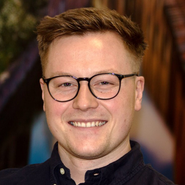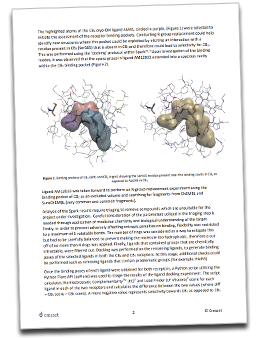Events
Identifying leads with targeted selectivity through virtual screening - optimizing the starting point to predict the molecules most likely to succeed
Date
Date: Thursday 12th October, 2023
Time: 2pm BST / 3pm CEST / 9am EDT / 6:30pm IST
Duration: 45 minutes
Format: Webinar
Identifying leads with targeted selectivity through virtual screening - optimizing the starting point to predict the molecules most likely to succeed
Cannabinoid (CB) receptors selectivity is an active area of research interest for several therapeutic reasons. The limited pool of potent analgesics has resulted in widespread use of opioid analgesics, causing rising cases of opioid addiction in the US. Targeting CB2 selectively has the potential to introduce a potent analgesic, without the psychoactive effects of CB1 binding, potentially reducing the usage of opioid based analgesics.
Virtual screening can be a great first step in designing receptor subtype-specific ligands and can be performed using protein-ligand structural data. We demonstrate how, by applying ligand-based computational methods combined with knowledge of structural biology and chemistry, we can define a novel ligand starting point prior to carrying out a virtual screen, resulting in hits with better receptor subtype selectivity.
About the presenters
Keverne Louison
Keverne Louison completed his PhD in Computational Medicinal Chemistry at the University of Nottingham, UK, where he worked on the design
 and synthesis selective ligands in GPCRs and computational method development for enhanced sampling methods. He joined Cresset as a Postdoctoral Scientist in 2021, where he has deepened his knowledge of computational chemistry in an industrial setting. Keverne has now moved into a role as Application Scientist in the Discovery team.
and synthesis selective ligands in GPCRs and computational method development for enhanced sampling methods. He joined Cresset as a Postdoctoral Scientist in 2021, where he has deepened his knowledge of computational chemistry in an industrial setting. Keverne has now moved into a role as Application Scientist in the Discovery team.
Scott Midgley
Scott completed his PhD in theoretical materials chemistry at the University of Reading. His computational modeling experience includes classical  and quantum mechanical methods for simulating excited states (photochemistry), thermodynamics of geochemical processes, and electronic properties of conductive Scott joined the Cresset Postdoctoral Program directly from his PhD in 2021, where he has redirected his skills towards drug design, applying his knowledge to studying the behavior of ligands and proteins. His broad computational modeling experience, as well as Python and machine learning expertise have allowed him to become involved in multiple areas at Cresset, including the development of new software features and aiding Cresset Discovery consultants on research projects. Scott has now secured a role as Application Scientist, Computational Chemistry in the Science team.
and quantum mechanical methods for simulating excited states (photochemistry), thermodynamics of geochemical processes, and electronic properties of conductive Scott joined the Cresset Postdoctoral Program directly from his PhD in 2021, where he has redirected his skills towards drug design, applying his knowledge to studying the behavior of ligands and proteins. His broad computational modeling experience, as well as Python and machine learning expertise have allowed him to become involved in multiple areas at Cresset, including the development of new software features and aiding Cresset Discovery consultants on research projects. Scott has now secured a role as Application Scientist, Computational Chemistry in the Science team.
Request Recording and case study pdf
 Please enter your details via the form below, and we'll be in touch to provide you with access to the webinar recording, along with a pdf of the full written case study.
Please enter your details via the form below, and we'll be in touch to provide you with access to the webinar recording, along with a pdf of the full written case study.